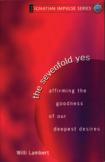Practical Spiritual Resources
These books are the first two titles in The Ignatian Impulse Series, a new series offered by Ave Maria Press. “By providing brief, readable and engaging books,” the publisher tells us, the series “presents the spirituality of Ignatius of Loyola as a practical resource for spiritual seekers of all faiths.” The series intends to make key aspects of Ignatian spirituality accessible in brief and inexpensive formats to a worldwide market. The present volumes are translations of original German texts.
Willi Lambert, a German Jesuit scholar of international renown, has written the first installment. He divides The Sevenfold Yes into seven chapters corresponding with what he calls “the sevenfold affirmations.” For Lambert this “affirmation structure” is universally relevant: “This sevenfold structure corresponds to the fundamental decisions of the way of the gospel, the way of the Spiritual exercises, indeed, the way of human life in its entirety.”
The seven affirmations, somewhat awkwardly expressed—at least in their English translations—are: the affirmation of attentiveness, the affirmation of a meaningful life, the affirmation of reconciliation, the affirmation of a life rooted in Christ, the affirmation of love despite struggle, the affirmation of resurrected love stronger than death and the affirmation of love in everyday life. These affirmations correlate with successive sections of the Spiritual Exercises: the Preliminary Annotations, the First Principle and Foundation, Week One, Week Two, Week Three, Week Four and the Contemplation for Obtaining Divine Love.
Lambert identifies three audiences for the book: those already familiar with the Spiritual Exercises, those beginning spiritual practices in the spirit of the Exercises and those just spiritually inclined to grow. He admits, however, and I strongly agree, that the book is most relevant for the first group. Since the text is laced with practical exercises and questions aimed to foster the realization of each affirmation, it is especially useful for retreat directors giving the Spiritual Exercises.
Initially I found myself resisting Lambert’s synthesis as too artificial and simplistic. Gradually, however, I became more comfortable with it. I suspect his schema is the fruit of a lifetime of reflection on the Spiritual Exercises. I now judge that Lambert’s distillation of the Spiritual Exercises into seven affirmations can be helpful for articulating the fundamental grace desired in each section of the Exercises. I plan to bring it along on my next retreat.
The second of the series, The Art of Discernment, is written by Stefan Kiechle, novice master for the German Jesuits since 1988. It is intended as a help for seeking God’s will in making good personal decisions, such as choosing an academic major, selecting a career, accepting a job, deciding whether or not to marry someone, picking a place to live, having children, resolving marital problems, becoming socially, politically or religiously engaged. The Art of Discernment attempts to explain the process of seeking God’s will as presented by Ignatius in the Spiritual Exercises.
The heart of the book is a description of three different ways people typically come to personal decisions. For some, decisions are made primarily by focusing on reason and logic, for others on emotions and feelings, and for still others on gut and intuition. Kiechle then correlates these three ways with the “three times” for making a decision seeking God’s will in the Spiritual Exercises. The “first time” for Ignatius flows from direct intuition, a direct divine inspiration that is unmistakable, like Saul’s calling on the road to Damascus. The “second time” focuses primarily on affections and deduces from affections and feelings the proper choice; this “time” is considered normative by Ignatius. The “third time” focuses on the rational approach, examining reasons for and against a particular alternative.
Kiechle then expands on Ignatius’ treatment. He notes that decisions are made most commonly by combining the second and third times. He points out that for Ignatius all decisions must foster the “greater” glory of God, the “more,” or, in Latin, the magis. He then offers three criteria that should be applied to a decision to ensure that the “more” is fulfilled. The first is greater fruitfulness: which alternative will be more fruitful for me and others? The second is greater spiritual consolation: which alternative offers more joy, peace and fulfillment? The third is a downwardly mobile career and poverty: which alternative will serve the interests of those who are farthest from the riches of the kingdom—the poor, the sick, the downtrodden?
By way of an aside, I should note that in applying the three criteria to a decision Kiechle is moving beyond Ignatius. For Ignatius the criteria of God’s will are peace, joy and energy (“spiritual consolation”) attaching itself to a particular alternative. When we discover this we have already discovered the “more” because we have discovered what God wants of us. The additional criteria become irrelevant.
The Art of Discernment is a helpful tool for those seeking God’s will in complex personal decisions. It helps identify and sort out all the factors, social and personal, that may be influencing a decision. And it is full of practical advice for seeking God’s will, free from all other influences.
Devotees of Ignatian spirituality can be grateful to Ave Maria Press for its new publishing project. The Ignatius Impulse Series can contribute significantly to contemporary spirituality.
This article also appeared in print, under the headline “Practical Spiritual Resources,” in the September 26, 2005, issue.








